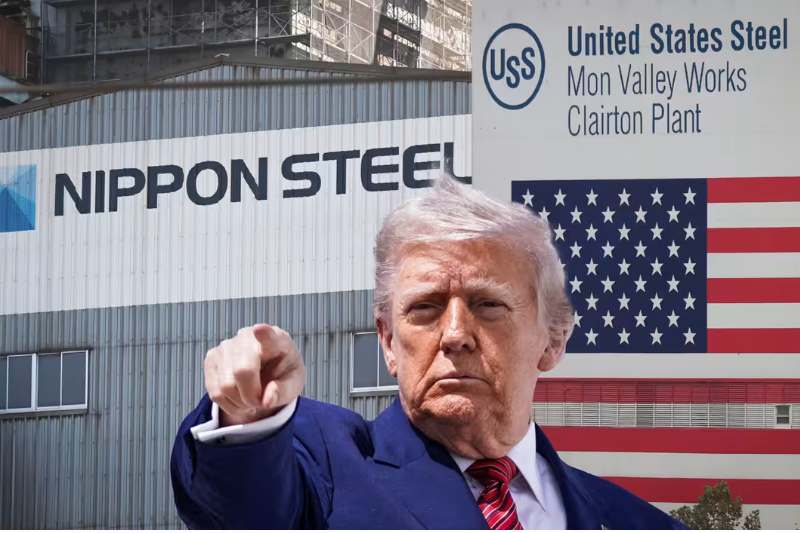
In a significant move affecting U.S. manufacturing and foreign investments, former President Donald Trump has approved the much-anticipated U.S. Steel acquisition by Japan’s Nippon Steel. The approval came only after the companies signed a comprehensive national security agreement aimed at protecting American interests.
This $14.9 billion deal is one of the most high-profile foreign investments in recent U.S. industrial history.
Nippon Steel is acquiring U.S. Steel in a landmark transaction valued at $14.9 billion. The merger, first proposed in late 2023, had been delayed due to political, labor, and national security concerns. Now, after months of negotiations, a binding national security agreement has allowed the Trump administration to greenlight the deal.
Key components of the agreement include:
A U.S. government “golden share” with veto power over strategic decisions.
U.S. Steel’s headquarters remaining in Pittsburgh.
An American CEO and a board dominated by U.S. citizens.
Steel isn’t just any product—it’s essential for infrastructure and defense. That’s why the proposed U.S. Steel-Nippon merger faced intense backlash. Critics argued that foreign ownership could compromise U.S. national security and manufacturing independence.
The United Steelworkers (USW) union raised red flags about potential outsourcing, long-term job losses, and lack of worker protections. Some lawmakers called for blocking the deal entirely.
Trump’s approval came with conditions. The national security agreement imposes strict oversight, ensuring the U.S. maintains control over key strategic decisions even after the merger.
The conditions include:
A “golden share” giving the U.S. power to veto decisions such as moving operations abroad or changing company leadership.
U.S. Steel must retain its American identity—name, leadership, and HQ must stay.
Mandatory $11 billion+ investment by Nippon Steel in U.S. facilities by 2028.
These measures allow foreign investment while protecting national interests and American manufacturing jobs.
The “golden share” concept is critical to this deal. It gives the U.S. government unprecedented power to block any strategic move that could weaken national security or hurt the domestic economy.
This includes:
Blocking plant closures in the U.S.
Stopping offshore relocations
Maintaining domestic production for defense and infrastructure projects
This clause assures that while Nippon Steel invests in the U.S., it cannot erode American control.
One of the major talking points in Trump’s approval was job security. Nippon Steel has committed to investing more than $11 billion in U.S. manufacturing projects, including:
Upgrading existing U.S. Steel facilities
Building new electric arc furnace plants
Exploring a potential greenfield steel plant in the U.S.
These projects are expected to create or safeguard over 100,000 jobs, especially in regions like Pennsylvania, Ohio, and Michigan.
Despite these commitments, the United Steelworkers union remains wary. They argue that they were not consulted during negotiations and question how the deal will affect collective bargaining, especially with their contract expiring in September 2026.
The USW has called for more transparency and demanded that worker rights be explicitly protected under the terms of the national security agreement.
Following the news of Trump’s approval and the signing of the security agreement, Nippon Steel shares jumped nearly 3%. Investors viewed the outcome as a win-win: U.S. interests are safeguarded while allowing Japanese investment in a critical American sector.
The merger is expected to boost confidence in regulated foreign investments in U.S. strategic industries.
Here’s what’s coming next:
Formal implementation of the national security agreement by U.S. authorities
Oversight by the Treasury Department and CFIUS (Committee on Foreign Investment in the U.S.)
Rollout of Nippon Steel’s U.S. investment projects, set to continue through 2028
The deal is likely to fully close by the end of 2025, pending all regulatory approvals.
Trump’s decision to approve the U.S. Steel–Nippon merger shows how foreign investment in key U.S. industries will be handled moving forward—allowed, but under tight scrutiny.
The inclusion of a golden share, domestic job protections, and billions in Nippon Steel investment makes this a unique case. It could become a model for future cross-border deals, especially in defense-sensitive sectors.
But as with any major corporate merger, the real impact will be judged not by policy, but by how it affects American workers on the ground.